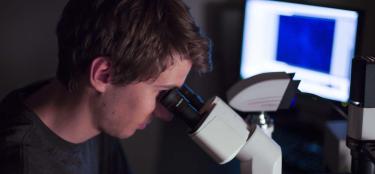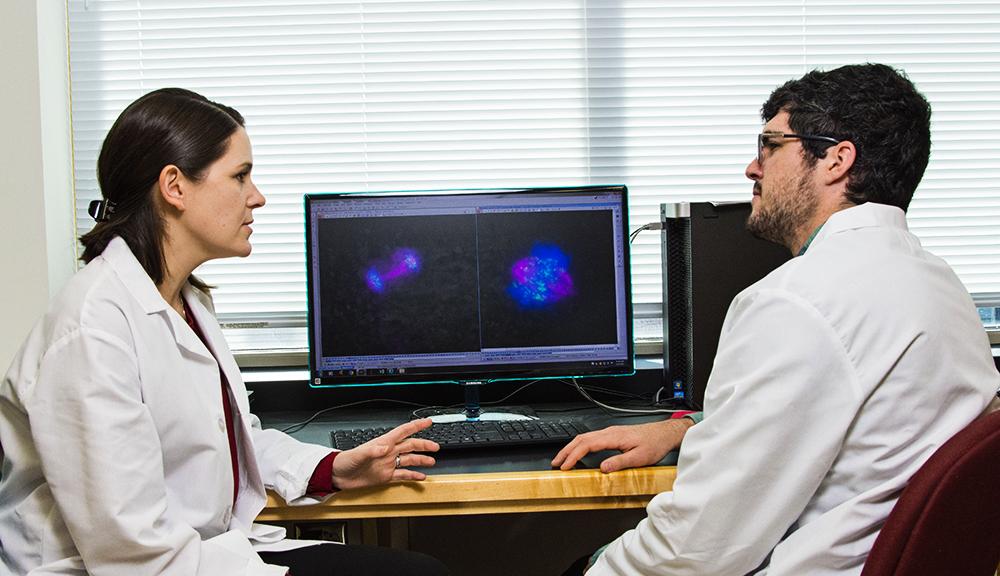PhD in Bioinformatics & Computational Biology

WPI’s PhD in Bioinformatics and Computational Biology (BCB) will prepare you to become a new type of scientist who can model complex biological processes and analyze and interpret the staggering volume of biological data arising from endeavors such as the Human Genome Project.
Our bioinformatics PhD program is truly interdisciplinary, enabling you to develop expertise across three key fields of study: Biology, Computer Science, and Mathematics. You will become well versed in all three as you work alongside our expert faculty researchers to create and apply the tools and algorithms necessary to predict, prevent, and cure disease, and to solve pressing environmental problems.

In our PhD in bioinformatics, you will work closely with a faculty advisor to plan an interdisciplinary course of study and research tailored to your background and interests. Through core courses, you will achieve a strong foundation in Biology, Computer Science, and Mathematics. Our bioinformatics and computational biology PhD also enables students to study advanced topics, including biovisualization, biomedical database mining, simulation in biology, and statistical methods in genetics and bioinformatics.
With our bioinformatics PhD program, you will gain career-boosting experiences through a required teaching and mentoring component, professional skills seminar, and optional internship with an industry partner.
Our bioinformatics PhD students are immersed in ground-breaking research aimed at developing and utilizing quantitative techniques to tackle important biological problems, from understanding the causes of complex diseases to modeling pollinator-plant relationships in ecosystems.
You’ll have many opportunities to get involved in such cutting-edge research in collaboration with faculty and students from departments across campus. In the first year of your program, you will complete at least two research rotations before choosing a research advisor.

Students in WPI’s bioinformatics program learn cutting-edge approaches in areas such as artificial intelligence (AI) and machine learning, next-generation sequencing, bioinformatics, systems biology, high-performance computing, big data mining, and visualization.

In addition to wet labs and facilities at UMMS, students may access resources in WPI’s Visualization Laboratory, Knowledge Discovery and Data Mining Laboratory, Database Systems Laboratory, and in several powerful computer clusters.

Students apply varied approaches to understand genetic and infectious diseases, prevent ecological disasters, develop new drugs and computational diagnostics tools, and explore new biological phenomena.

Biology, computer science, and mathematics—these disciplines contribute to advances in biological and biomedical science. At WPI, collaboration between disciplines leads to greater discoveries.
You’ll work alongside faculty and student researchers from across multiple disciplines in our state-of-the-art Life Sciences and Bioengineering Center at Gateway Park, where an open-plan lab format encourages collaboration. You will also have access to computational labs, including our groundbreaking Visualization and Image Science Laboratory.
Need to Earn a Bioinformatics Masters?
Maybe you already have a solid foundation in computing and biology, but are looking to become a bioinformatics scientist in one of the top bioinformatics PhD programs? Do you want to leverage cutting-edge approaches in the lab to your workplace and discover a high ROI with a bioinformatics PhD salary? Our bioinformatics masters is unlike many others as it draws from biology, computer science, and mathematics for a truly interdisciplinary experience. A master’s in bioinformatics will give you the expertise to solve real-world problems worldwide and in healthcare.
Have a Passion for Biological Systems? Focus Your College Search & Explore a BS in Bioinformatics.
Have you always had an edge for mathematics, computers, and biology? With our bioinformatics bachelor’s degree, you don’t have to choose between the three. Unlike many schools that offer this degree as a concentration within biology, our bioinformatics undergraduate program encompasses all three disciplines. Whether you’re interested in statistical methods in genetics or database mining, our BS enables you to explore what interests you most. Looking to save some time? We offer a combined BS/MS option in five short years!
Maybe you have an interest in learning how to apply math and computer science to biological issues, but want to focus on a different discipline for your major? We offer a flexible minor in bioinformatics which provides students the preparedness necessary for a career that requires some critical thinking in quantitative biology.
Have questions?
WPI's dedicated graduate student support team can help.
Refer a Friend
Do you have a friend, colleague, or family member who might be interested in a WPI graduate program? Click below to tell them about our programs.
Faculty Profiles





WPI is proud to be the recipient of not one, but two National Science Foundation Research Traineeship programs. The programs provide exceptionally talented graduate students with specialized training and funding assistance to join careers at the forefront of technology and innovation. The programs are for graduate students in research-based master's and doctoral degree programs in STEM.